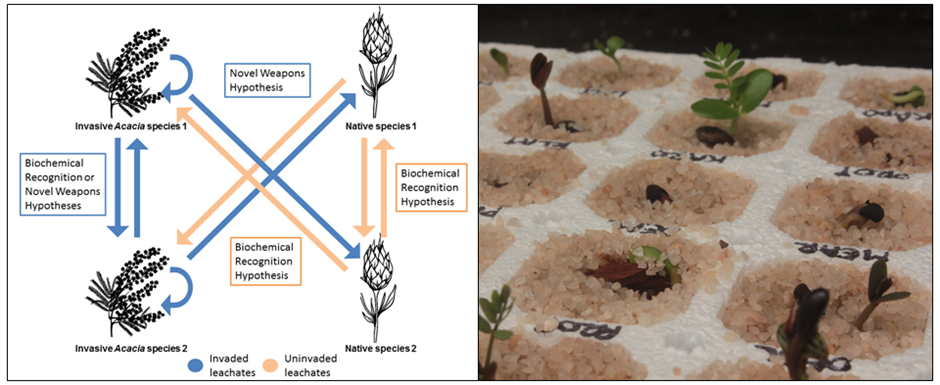Over the past decade research has been done towards understanding the role of phytochemicals in the success of plant invasions. This research has led to the well-known Novel Weapon Hypothesis, which suggests that the release of certain phytochemicals by alien plants can inhibit the early development of native species that have not previously experienced them, thus granting alien species a competitive advantage. Yet, in native communities, such chemicals help to shape the co-existence of plant species that share evolutionary histories, either by signaling competition avoidance or the presence of suitable conditions. This is in line with the Biochemical Recognition Hypothesis.
Though the focus of most studies so far has been on investigating the negative impacts of phytochemicals released by invasive species on native plants, a recent study by researchers at the C·I·B argues that these chemicals may also have stimulating effects on invasive species establishment.
Using an experimental approach, the study led by former C·I·B postdoc Florencia Yannelli explored the effect that phytochemicals released by invasive Australian acacias and native species had on the germination and early growth of both native and invasive species. To do so, researchers from Spain and South Africa, including Associate Professor Jaco Le Roux, former C·I·B postdoc Ana Novoa and former C·I·B visiting PhD student Jonatan Rodríguez, collected the phytochemicals released by leaves and flowers of the selected plants.
The researchers tested the effects of these chemicals on the germination and early growth of alien and native species. Contrary to most studies to date, these researchers were not only interested in the detrimental effects of acacia-released phytochemicals on natives, but also how they affected other invasive acacias. Their results revealed that acacia phytochemicals mostly had a stimulating effect on the germination and early growth of the same or other invasive Acacia species. These effects were independent of whether acacias shared evolutionary history in their native range or not.
Interestingly, Yannelli et al. also found that phytochemicals collected from native plants in uninvaded areas in South Africa stimulated the germination of the native Sweet thorn (Vachellia karroo) and the invasive Port Jackson (Acacia saligna). While this outcome supports the Biochemical Recognition Hypothesis, the experiments did not yield evidence for the Novel Weapons Hypothesis.
Taken all together, results from the study suggest that invasive acacias may experience phytochemically-induced cues signaling suitable conditions for emergence, ultimately facilitating the invasion process. Such cues can play a role in assuring the success of alien species under harsh environmental conditions, where plants depend on facilitating species or the right conditions for species to emerge. These findings fit well with another study by these researchers that found that changes in soil microbiota and chemistry in response to Acacia invasion facilitate the growth and enhance the performance of acacias (see Le Roux et al. 2018).
“This is the only study so far to provide evidence for the stimulatory effects of phytochemicals released by acacias and the role they may have in aiding invasion success of congeneric species. Such aspects have rarely been studied in invasion ecology,” said Florencia. “We hope that the study will pave the way for future experiments testing these effects under field conditions, to understand how important they are when acting in concert with other effects of invasions”.

Read the papers
Le Roux, J.J., Ellis, A.G., van Zyl, L.-M., Hosking, N.D., Keet, J.-H., and Yannelli, F.A. (2018). Importance of soil legacy effects and successful mutualistic interactions during Australian acacia invasions in nutrient-poor environments. Journal of Ecology 106(5), 2071-2081. https://doi.org/10.1111/1365-2745.12965
Yannelli, F.A., Novoa, A., Lorenzo, P., Rodríguez, J., and Le Roux, J.J. (2020). No evidence for novel weapons: biochemical recognition modulates early ontogenetic processes in native species and invasive acacias. Biological Invasions 22(2), 549-562. https://doi.org/10.1007/s10530-019-02110-w
For more information, contact Florencia Yannelli at Florenciayannelli [at] gmail.com
